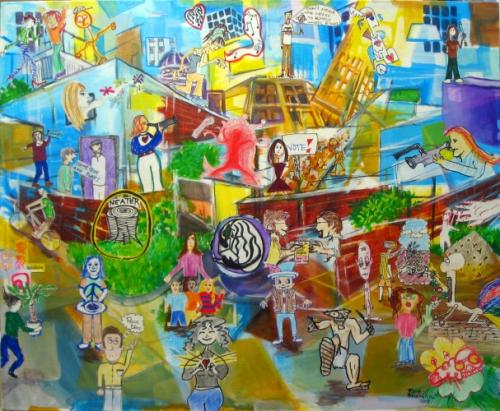Compulsory political education is a must if we are to stem the flow of disengagement from politics
It is little wonder that young people continue to be turned off politics, argues Matteo Bergamini, when politics is something that is generally not discussed at school. He argues that we need dedicated political education to help young people understand the system that they are expected to become full participants in upon reaching the age of majority.
As a society, we seem to be unsure about when someone becomes an adult. Is it a physical change? Or is it a mental or emotional change? While numerous opinions exist on this matter, the only real agreement for most is that legal adulthood occurs at 18 when young people are permitted to purchase alcohol and tobacco, vote in elections, and receive their full complement of rights as adults.
Yet I often wonder how it is that we came to this conclusion about maturity and voting. Throughout our schooling young people are rarely taught about politics at all, and if they are it usually mentioned in passing by occasionally untrained citizenship teachers, many of whom are coerced into delivering citizenship education classes by the heads of the school to save costs.
We live in one of the oldest and most established democracies in the world. Yet politics is notable only by its absence from the school curriculum, leaving many young people who are interested in social change unable to understand the link between politics and their own world. My generation is often considered one of the most politically apathetic and yet I ask myself, why shouldn’t we be? Politics is never at the forefront of discussions in schools, leaving young people to rely on the media and their families to provide education on the subject of politics.
This reality has left huge numbers of young people disheartened and detached from politics and their democracy. This is natural by-product of the media’s relentless attack on politicians and the wider cynicism that exists across society. More and more young people in Britain are however becoming interested in politics, due to the financial crises and effect that this has had on their life chances. Moreover, global movements have grown in influence as basic liberty and freedom comes under threat.
Yet many young people remain unsure how to become politically engaged and active because they simply don’t know how to. The need for dedicated political education in schools is becoming acute, as young people are becoming more interested in social issues. Thanks to social media and the internet, they have the world ‘at their fingertips’. No longer, for example, can the brutality of conflicts around the globe escape the eyes of the masses.
Yet many young people remain unsure of the complex maze that is democracy and the political process in this country. With no political education, it is not dissimilar from being handed a book in Mandarin Chinese and being expected to read it cover to cover. Political education in schools should to teach young people how the government works, how new laws are introduced, the differences in neighbouring democratic countries and finally how to become directly involved in British Politics. It should offer young people an inroad into British democracy, its benefits and all our duties to upholding it.
Within the education systems of the United Kingdom, subjects such as mathematics and English are viewed in high esteem when compared to citizenship education – a subject which retains the stigma of lesser status by universities and employers alike. The lack of sufficiently trained citizenship teachers further diminishes its status in schools. It is not surprising that young people view politics within disdain if it is regarded as a lesser subject and school and derided in the media too.
Politics, however, is part of everyone’s life and young people need to learn of its relevance and impact on their lives from an early age. In a rapidly changing world, it is vital that adults provide appropriate opportunities for young people to learn the knowledge and skills to become politically active and to seek to defend our democracy.
As such, it seems accurate to say that politics will become increasingly irrelevant if young people are not educated in how democracy works.
Governments across the UK often talk about the need for citizens to respect their rights and duties. They fail however to explain how we can understand these if we aren’t taught them at school. We are currently expected to receive much of the information required to become politically active via our parents and political parties without acknowledging the potential for political bias. A good, solid and unbiased education in politics through the introduction of a Politics GCSE for everyone would give young people the information they need and require to become active citizens of the future.
—
This post is part of a series on youth participation based on the Political Studies Association project, Beyond the Youth Citizenship Commission. For further details, please contact Dr Andy Mycock. An electronic copy of the Beyond the Youth Citizenship Commission: Young People and Politics volume can be downloaded here.
Note: This post represents the views of the author and does not give the position of the LSE or Democratic Audit. Please read our comments policy before commenting.
—
 Matteo Bergamini is the Founder and Director of Shout Out UK, one of Britain’s fastest growing Alternative news network.
Matteo Bergamini is the Founder and Director of Shout Out UK, one of Britain’s fastest growing Alternative news network.






 Democratic Audit's core funding is provided by the Joseph Rowntree Charitable Trust. Additional funding is provided by the London School of Economics.
Democratic Audit's core funding is provided by the Joseph Rowntree Charitable Trust. Additional funding is provided by the London School of Economics.
AS unit 1- Pol Participation: Compulsory political education is a must if we are to stop disengagement from politics https://t.co/VVtAP3rA5e
“many young people interested in social change don’t get the link betwn politics & their own world” https://t.co/YxsMFTgGRV @democraticaudit
What role can political education play in ending youth disengagement from politics? https://t.co/6xgJszb8j8
“@democraticaudit: What role can political education play in ending youth disengagement from politics? https://t.co/uGwm7uLRRX” @TWowk
“@democraticaudit: What role can edu play in ending youth disengagement from politics? https://t.co/jrK8JrsFDG” – fair point – @JohnAFlood
Check out this article in @democraticaudit about compulsory political education to increase engagement in politics: https://t.co/BKxWVLMfD9
Politics GCSE for all? Matteo Bergamini on @democraticaudit https://t.co/ZXjqCjjrfQ
Excellent.
Compulsory political education is a must if we are to stem the flow of disengagement from politics https://t.co/uLjPd95Sah
Including citizenship in curriculum is great but ‘Compulsory political education’ sounds Soviet-terrible. https://t.co/w07EcT2Dhs @PJDunleavy
Are you suggesting that educating our young people in how politics works is soviet?! We need political education to tell generations after us how the system works.
Not to educate people about Conservatives and Labour etc… but how the institutions work and how to get involved! In my opinion all generations need this and setting something like Compulsory political education in schools makes sure that future generations aren’t as clueless as the majority of us currently are. ~Matteo
RT @democraticaudit: Do we need compulsory political education? https://t.co/eZTj3goI5q
RT @PJDunleavy: Compulsory political education is a must if we are to stem the flow of disengagement from politics https://t.co/vtascVhvME
Interesting post on @democraticaudit Should political education be compulsory? https://t.co/ybz3UzdGsQ
Compulsory political education is a must if we are to stem the flow of disengagement from politics https://t.co/uBDgBpqcYp
“@democraticaudit: Compulsory pol edu must to stem disengagement from politics https://t.co/kwL7S0xUXd” <- certainly true not just for UK